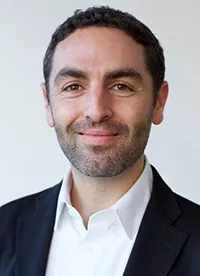The Front Lines of Change: Tracking Business Behavior During COVID-19

For many Swarthmore students, the summer of 2020 has been a time of activism and agency as they organize, overcoming COVID-19 limitations, and work to make positive change in their communities through a variety of initiatives. This is the sixth and final entry in a series of stories about their effort and success in engagement for social justice.
Previously: Making the Black Experience Visible; Helping Low-Income Students Translate Their Experiences; Bringing Computer Science Education to Chester and Beyond; Podcasting About Race, Higher Education, and Career Building; Defending the Rights of Immigrants and Asylum Seekers
Daniel Torres-Balauro ’23 learned this May that he would not be returning to his family in American Samoa because the pandemic had caused its borders to close. In addition, his planned summer internship with Samoan Congressional Delegate Amata Coleman Radewagen in Washington, D.C., was put on hold.
Sequestered in his Wharton dorm room, Torres-Balauro spent much of his time scrolling through news stories about the pandemic. In particular, he was struck by the number of articles about companies that had laid off workers and failed to offer paid sick leave or sufficient health and safety protocols.
“It was frustrating to see so many people losing their jobs, especially when these companies are large corporations that could afford to give these people hazard pay or give them paid leave,” he says.
At this time, he had reallocated his funding from the Lang Center for Civic & Social Responsibility to intern at Progressive Shopper, a startup co-founded by social entrepreneur Mark Hanis ’04. Progressive Shopper maintains a Chrome and Firefox browser extension that informs consumers about the political contributions of the large companies they visit for online shopping.
Hanis and Torres-Balauro felt that consumers should know which companies were acting irresponsibly during the pandemic. Though the Progressive Shopper browser extension would allow them to display such information, Hanis and Torres-Balauro realized that no one was aggregating data on companies’ behavior during COVID-19. So they decided to make a system to evaluate the behavior themselves. Hanis thought that such a system could work similarly to the Human Rights Campaign’s Corporate Equality Index, which rates companies based on their policies toward and treatment of LGBTQ+ employees.

Mark Hanis '04
Their new system, the Corporate COVID-19 Index, uses 14 criteria to evaluate companies’ efforts to minimize worker unemployment, secure worker health and financial security, and support suppliers, community members, consumers, and COVID-19 relief funds.
To make sure their rating would accurately reflect companies’ overall behavior, Hanis and Torres-Balauro consulted with a labor expert at the AFL-CIO as well as Swarthmore professors Syon Bhanot and Denise Crossan. Bhanot is a behavioral and public economist, and Crossan is the Eugene Lang Visiting Professor for Issues of Social Change.
A partner at North Carolina State University’s Supply Chain Resource Cooperative is now creating a machine-learning algorithm to replace Torres-Balauro’s manual evaluations. While the pair are waiting for the rating system to become automated, they’ve already been able to release several ratings online, including on their Instagram account.
Visibility for both the Corporate COVID-19 Index and Progressive Shopper has grown significantly since the pandemic hit; a few weeks ago, Marie Claire Australia covered the site. In terms of growth during the past few months, 26,000 people have now installed the Progressive Shopper browser extension — 26 times the number of installations from before the pandemic.
“COVID is happening just as Gen Z and millennials are growing in their market power,” Hanis says. “They’re demanding companies behave more ethically and more in line with their values.”
To develop the Corporate COVID-19 Index, Hanis and Torres-Balauro worked closely despite the distance, interacting several times each day.
“Startups are just really, really hard, because a lot of people don’t know about you and they’re going to be skeptical or cautious about what you’re trying to do,” Hanis says. “So it’s been amazing to work with Daniel.”
Torres-Balauro will take a step back from the project this fall as he continues living on campus and begins classes. He and Hanis are in talks with several business schools, unions, and other organizations to take on the Corporate COVID-19 Index project in the near future. Progressive Shopper will also continue to expand its criteria outside of political donations by including ratings for climate responsibility and labor rights, Hanis says.
For Torres-Balauro, this summer was wildly different from what he expected — but his experience with Hanis gave him yet another example, he says, of the surprising impact that a simple desire for change can make.
“The biggest thing was understanding my role in this and how I could actually make an impact in the world,” he says. “I’ve realized that [social entrepreneurship] is helpful, necessary, and the kind of thing I can do in the future. And whether or not I go to law school or I end up doing social entrepreneurship, my main goal will always be to hold institutions accountable.”



